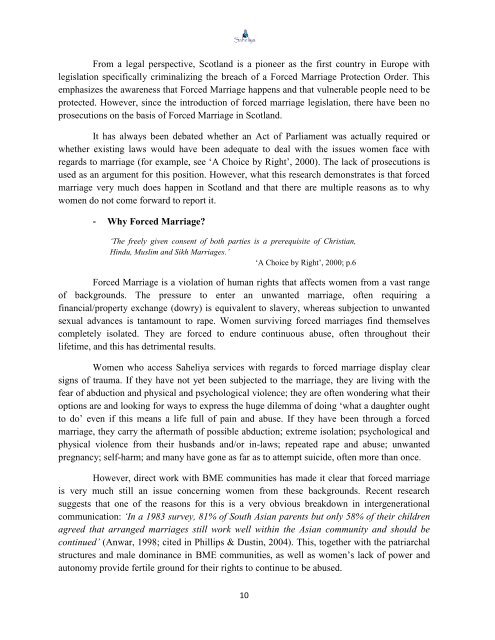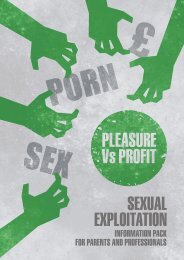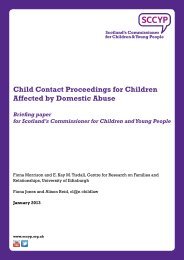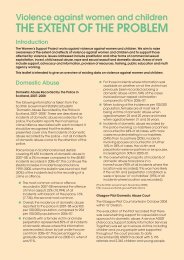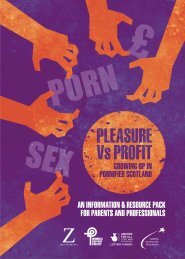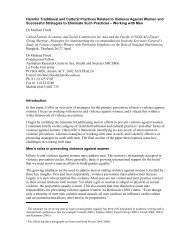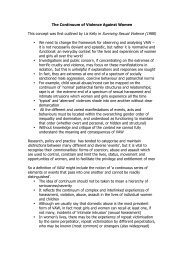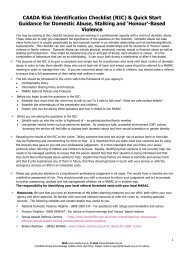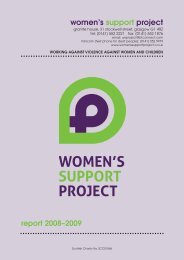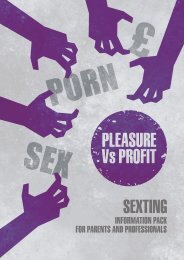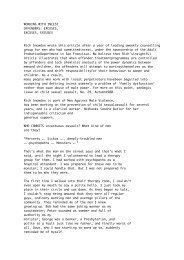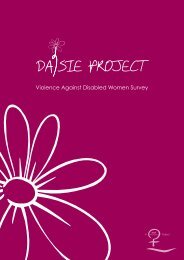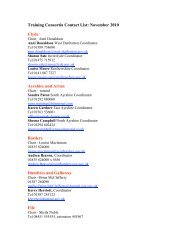WOMEN AND FORCED MARRIAGE IN SCOTLAND
women and forced marriage in scotland - Women's Support Project
women and forced marriage in scotland - Women's Support Project
- No tags were found...
You also want an ePaper? Increase the reach of your titles
YUMPU automatically turns print PDFs into web optimized ePapers that Google loves.
From a legal perspective, Scotland is a pioneer as the first country in Europe with<br />
legislation specifically criminalizing the breach of a Forced Marriage Protection Order. This<br />
emphasizes the awareness that Forced Marriage happens and that vulnerable people need to be<br />
protected. However, since the introduction of forced marriage legislation, there have been no<br />
prosecutions on the basis of Forced Marriage in Scotland.<br />
It has always been debated whether an Act of Parliament was actually required or<br />
whether existing laws would have been adequate to deal with the issues women face with<br />
regards to marriage (for example, see ‘A Choice by Right’, 2000). The lack of prosecutions is<br />
used as an argument for this position. However, what this research demonstrates is that forced<br />
marriage very much does happen in Scotland and that there are multiple reasons as to why<br />
women do not come forward to report it.<br />
- Why Forced Marriage?<br />
‘The freely given consent of both parties is a prerequisite of Christian,<br />
Hindu, Muslim and Sikh Marriages.’<br />
‘A Choice by Right’, 2000; p.6<br />
Forced Marriage is a violation of human rights that affects women from a vast range<br />
of backgrounds. The pressure to enter an unwanted marriage, often requiring a<br />
financial/property exchange (dowry) is equivalent to slavery, whereas subjection to unwanted<br />
sexual advances is tantamount to rape. Women surviving forced marriages find themselves<br />
completely isolated. They are forced to endure continuous abuse, often throughout their<br />
lifetime, and this has detrimental results.<br />
Women who access Saheliya services with regards to forced marriage display clear<br />
signs of trauma. If they have not yet been subjected to the marriage, they are living with the<br />
fear of abduction and physical and psychological violence; they are often wondering what their<br />
options are and looking for ways to express the huge dilemma of doing ‘what a daughter ought<br />
to do’ even if this means a life full of pain and abuse. If they have been through a forced<br />
marriage, they carry the aftermath of possible abduction; extreme isolation; psychological and<br />
physical violence from their husbands and/or in-laws; repeated rape and abuse; unwanted<br />
pregnancy; self-harm; and many have gone as far as to attempt suicide, often more than once.<br />
However, direct work with BME communities has made it clear that forced marriage<br />
is very much still an issue concerning women from these backgrounds. Recent research<br />
suggests that one of the reasons for this is a very obvious breakdown in intergenerational<br />
communication: ‘In a 1983 survey, 81% of South Asian parents but only 58% of their children<br />
agreed that arranged marriages still work well within the Asian community and should be<br />
continued’ (Anwar, 1998; cited in Phillips & Dustin, 2004). This, together with the patriarchal<br />
structures and male dominance in BME communities, as well as women’s lack of power and<br />
autonomy provide fertile ground for their rights to continue to be abused.<br />
10


